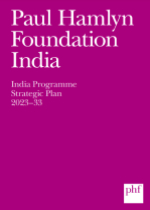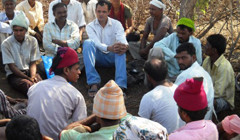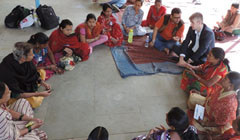SAAD
Rs. 3,173,200 awarded over four years to Social Action for Association and Development (SAAD)
Among the most vulnerable communities in the relatively prosperous state of Maharashtra are the dalit (‘untouchable’) communities, which have been traditionally dependent upon folk dancing and have had to depend on the charity of the more influential people of the area. These communities are also among the poorest, have no land or other productive assets and have had almost no access to education or other opportunities to help them build an alternative livelihood.
The condition of women and girls in these communities is distressing. Many young girls are married off to the local ‘god’ (devadasis/aradhyas) from where they end up as prostitutes. Others from traditional folk dancing communities (Tamasha is a traditional dance form here) have also degenerated into dancing in bars and into prostitution.
PHF has supported SAAD in its work with this extremely vulnerable group. Over three and a half years, the organisation worked with dalit communities in 90 villages in the Parbhani district of Maharashtra to understand the issue from the perspective of women and address the causes and effects of discrimination and exclusion. It aimed to do this by forming women’s self-help groups as a mechanism for them to come together, share their concerns and pool their strengths.
The project was able to build strong community groups and support them to help overcome their exclusion, and access welfare schemes and entitlements. The groups were also able to address the issue of violence and seek family counselling and legal assistance where necessary to claim their rights.
Almost 148 women have been supported to set up alternative livelihoods including small trading and running beauty salons. Some young women still find the theatre group as a means of livelihoods an attractive proposition. However, the self-help groups of dalit women have been successful in setting up a leather business and are now ready to expand it.
Simultaneously, to ensure a better future for children, SAAD facilitated the setting up of pre-school centres for the younger children. Over 800 children from the community have benefited from this initiative. As they have grown up they have been enrolled in regular schools with support to prevent them from dropping out. Thirty four older girls who had dropped out have been facilitated back to school.
The project has made good progress on all fronts. Strengthened self-help groups have been able to access loans and livelihood projects from the government, cases of domestic and other forms of violence have been counselled and taken to court where necessary, and the process has built a momentum which is keeping it going. Most crucial, however, has been the creation of 1,299 women leaders who have begun to exercise their rights to help themselves and their communities mobilise government support for projects relevant to them, play active roles in local governance and express their identity in public forums.
SAAD is an example of how funds from PHF have been effectively used, leading to the development of partnerships with like-minded organisations and leveraging support from other donors to keep the initiative going.


